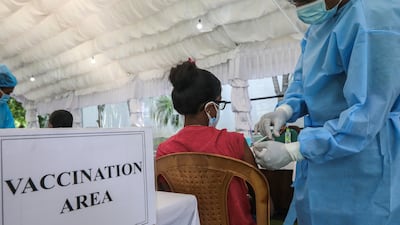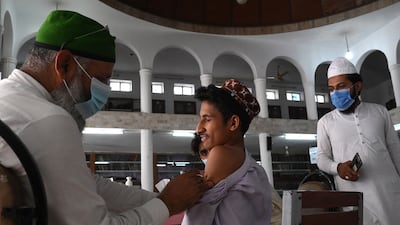Follow the latest updates on the Covid-19 pandemic here
Travellers from India have been be restricted from entering the UAE until July 21.
Emirates Airline on Monday said people flying from Pakistan, Bangladesh and Sri Lanka would also be stopped from entering the UAE until that date.
The suspension has been extended several times since a ban on passenger flights from India was announced in late April. A handful of exemptions exist, including diplomatic staff and golden visa holders.
Here, we look at the coronavirus situation in five of the most populous nations in south Asia.
India
The UAE originally halted passenger flights from India in late-April, when it became clear the country was in the grip of a second wave of Covid-19 infections.
At the peak in May, India recorded 400,000 new cases and 4,500 deaths a day, although experts said the real figures were probably much higher.
But new cases and deaths have since plummeted to less than a tenth of the peak, with 30,827 infections reported on Monday.
But experts predict a third wave is around the corner.
A report by SBI Research said cases would start to increase again by mid-August, peaking in September.
The concern was shared by the Indian Medical Association, which said on Monday that a third wave was “inevitable and imminent”.
Data shows it may have already begun. The rate of decline in new cases has slowed considerably in the past week, with five states recording an increase in cases others reporting only marginal drops.
Less than 5 per cent of the country is fully vaccinated against Covid-19.
Sri Lanka
Flights from Sri Lanka to the UAE were suspended in May, before the Eid Al Fitr holiday, after Sri Lanka reported a surge in infections.
In late June, the Sri Lankan government imposed a two-week ban on passengers arriving from Gulf states, saying the move was a result of coronavirus rules without elaborating further.
Sri Lanka recorded a sharp increase in Covid-19 cases at the same time as India, leading to a lockdown in mid-May.
This week it reopened many public places, permitting theatres, cinemas and museums to operate at half their normal capacity. Hotels and restaurants were also allowed to reopen with safety measures in place.
During its infection peak, the country with a population of almost 22 million recorded more than 3,600 cases a day. On Monday, it registered 1,568 infections.
Authorities have fully vaccinated 1.4 million people, about 15 per cent of the country.
Bangladesh
Bangladesh is currently in the grip of a third wave fuelled by the highly infectious Delta variant.
Passenger flights from the country to the UAE were halted in May.
On Monday, it recorded its highest increase in new cases, with 13,768 infections and 220 deaths.
A lockdown was imposed at the start of the month to bring the spread of the virus under control, with malls, cinemas, markets and private offices being closed.
Public transport was suspended and gatherings banned, with people only permitted to make essential trips for food or medicine.
About 4.3 million people have been vaccinated against the disease, less than 3 per cent of the population.
Nepal
Passenger flights from Nepal to the UAE were suspended in May.
Nepal suffered a brutal second wave at about the same time as its neighbours, with more than 9,000 daily cases recorded in mid-May.
At the peak, about 45 per cent of tests returned positive results, suggesting the official case tally was a major undercount.
A two-month lockdown was imposed, which was partially lifted in late June.
New cases have since receded and 1,690 were reported on Monday.
About 6 per cent of its population has been fully vaccinated.
Pakistan
Flights from Pakistan to the UAE were halted in May.
Pakistan reported a third wave that month, when daily case tallies reached more than 6,000.
They steadily fell in the run up to June, but the government has said there are “clear signs” a fourth wave has already begun.
"Two weeks ago, I had tweeted that our artificial intelligence models are showing the possible emergence of a fourth wave,” said Asad Umar, Pakistan’s Minister for Planning, Development and Special Initiatives.
“Now there are clear early signs of a fourth wave starting.”
But he has said the government will not impose a complete lockdown in response.
There has been a three-fold increase in the number of people testing positive for the virus in the past three weeks, government data showed.
On Monday, the country recorded 1,808 new cases.
Pakistan has fully vaccinated about 4 per cent of its population.


















